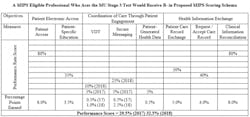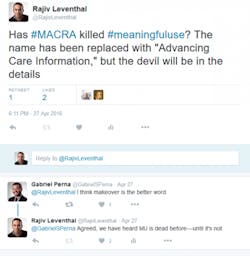It was on Jan. 11 when Centers for Medicare & Medicaid Services (CMS) Acting Administrator Andy Slavitt said at a healthcare conference in San Francisco—and then doubled down on Twitter— that “the meaningful use program as it has existed will now be effectively over and replaced with something better.”
At that time, no one really knew what the proposed Medicare Access and CHIP Reauthorization Act of 2015 (MACRA) rule that just came out last week would look like. In fact, just a few months prior to Slavitt’s bold claim, in October 2015, CMS released a final rule for Stage 3 of its meaningful use program. Indeed, after the industry had a chance to digest those words from Slavitt, health IT leaders across the country cautioned folks not to overreact to what the CMS senior official said, saying that meaningful use will not be going away anytime soon. But now, with the release of the proposed MACRA rule, starting in 2017, meaningful use will now be dubbed the “Advancing Care Information (ACI)” program for Medicare-participating doctors, and will account for 25 percent of an eligible physician’s (EP) total score under the Merit-based Incentive Payment System (MIPS) in the first year.
As such, this confusion around the health IT industry has again brought up a question we have heard more than once in recent months: is meaningful use, as we know it, over? I won’t try to complicate things even more in this space, but the answer to that question is both yes and no.
As I wrote in a story last week looking at the “new” MU program, “Under the Advancing Care Information category, clinicians would choose to report customizable measures that reflect how they use technology in their day-to-day practice, with a particular emphasis on interoperability and information exchange. Unlike the existing meaningful use reporting program, this category would not require all-or-nothing electronic health record (EHR) measurement or redundant quality reporting, according to a CMS press release. Instead, the ACI category consists of two components: the base score, in which an eligible physician can earn 50 percent of his or her total points, and a performance score to make up the rest.”
The key takeaway here is that within both the base and performance scores, there are no thresholds that a clinician has to meet, meaning the pass/fail component of the program that has frustrated physicians to date is no longer present under ACI. As Leslie Krigstein, vice president of congressional affairs, at the College of Healthcare Information Management Executives (CHIME) said in last week’s story, under the old MU, as it stands today, clinicians would fail the whole program if they don’t meet a specific threshold. “So yes your score will get hurt if your [performance score under ACI is low], but you won’t fail the entire program,” Krigstein said.
That being said, I did a deep dive into the 962-page rule last week with Jeffery Smith, vice president, public policy, at the American Medical Informatics Association (AMIA), who correctly pointed out that for the performance part of clinicians’ MIPS scores, EPs will still be graded on how many patients they get to perform an objective, such as view/download/transmit (VDT) their health information, for example (the higher the number, the higher the MIPS score). So, In the below, graphic, made by Smith himself, he says that a MIPS-eligible professional who aces the MU Stage 3 test would receive a B- in the proposed MIPS scoring schema.
Source: American Medical Informatics Association
Krigstein counters this point by noting that all of an EP’s performance categories are being rounded up into one larger score, as there are other categories, in addition to meaningful use, under MIPS. Under the current meaningful use program, that doesn’t exist. Also, there are bonus points to be earned under the new program for public health and clinical data registry reporting, she says.
Without getting too deep into the math behind a MIPS score, the main point here is something Smith said to me last week: “While the all-or-nothing aspect is gone, physicians will still have to perform to a similar set of objectives and measures that were going to be required in Stage 3 of MU anyway.” So with this in mind, how can a program truly be “dead” or “over” if the core functionalities and requirements of that said program are still very much in place?
This is why I was hesitant myself to use these adjectives when describing the future of MU. In fact, when the rule came out last week, I had this very exchange with a former colleague of mine on Twitter:
At the end of the day, the words you use to describe meaningful use are not the most important thing in the world. But, it should certainly be noted that like with most policies in health IT, the devil is indeed in the details.
For eligible Medicare physicians, it remains to be seen if they will be satisfied with the new ACI program. While, on the surface, CMS will point to the removal of certain constraints that the provider community has long asked for, there will still be many challenges and complexities moving forward. I think we can safely say one thing though—now that we have seem to have some stability within the soon-to-be-finalized MACRA law, this might be the last “Is meaningful use dead?” blog you see from me for a while. And to that I say, Amen!





